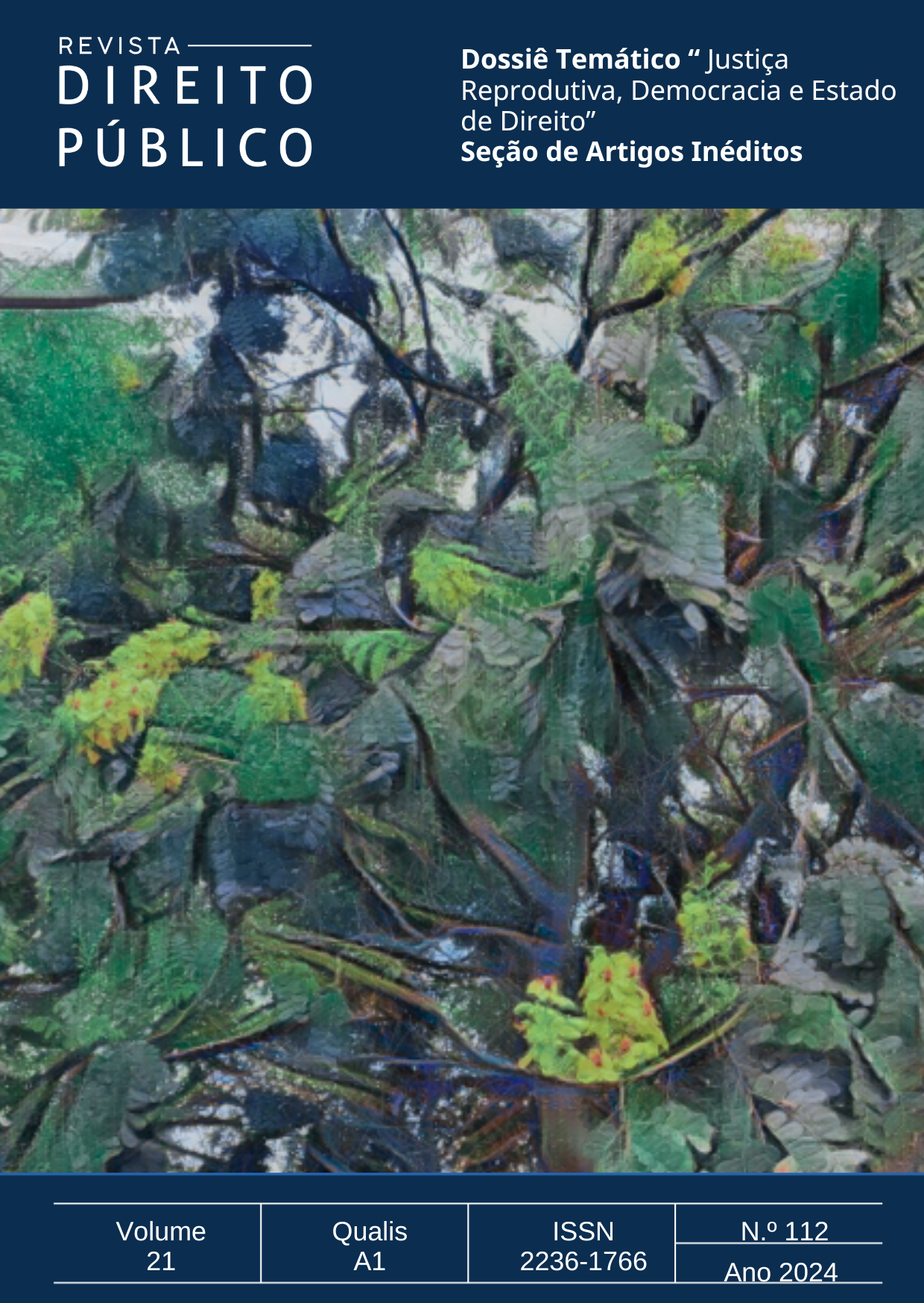Carta Editorial
DOI:
https://doi.org/10.11117/rdp.v21i112.8239Downloads
Referências
COLEN, K.S., TERRA, N. C.Quando os Dispositivos Jurídicos são Insuficientes? Contribuições Feministas Decoloniais ao Debate sobre Justiça Reprodutiva a partir das Violações ao Aborto Legal no Brasil. Direito Público, 21(112). DOI: https://doi.org/10.11117/rdp.v21i112.7712
RAMOS, M. M., ALKMIN, G. A “Juridificação” da Reprodução: Uma Análise de Decisões do Supremo Tribunal Federal à luz da Justiça Reprodutiva (2012-2023). Direito Público, 21(112). DOI: https://doi.org/10.11117/rdp.v21i112.7717
SILVA, A. P. S., ROCHA, R. Meu corpo, regras deles? Limitações à autodeterminação das mulheres na escolha da via de parto e a relação médico-paciente. Direito Público, 21(112). https://doi.org/10.11117/rdp.v21i112.7772
VERDUM, A. C.C, PORCINO, E. R.A, MEDEIROS, T. G. A injustiça reprodutiva como dupla punição: análise foucaultiana da obra “Prisioneiras” em cotejo com dados empíricos do sistema carcerário brasileiro. Direito Público, 21(112). DOI: https://doi.org/10.11117/rdp.v21i112.7782
SCIAMMARELLA, A. P. O., ANSARI, M. R., AMAYA, A. C.L , CARVALHO, A. N.S. Ventres Livres, Corpos Cativos: Da Injustiça Urbana à Injustiça Reprodutiva nos Corpos-Território das Mulheres do Conjunto de Favelas da Maré. Direito Público, 21(112). DOI: https://doi.org/10.11117/rdp.v21i112.7715
GONCALVES, J.S, SIMIONI, F. Esterilização forçada de mulheres negras e indígenas no Brasil e no Canadá (2015 - 2019): Entre a Colonialidade Global e a Justiça Reprodutiva. Direito Público, 21(112). DOI: https://doi.org/10.11117/rdp.v21i112.7767
SHELDON, S. A descriminalização do aborto: Um argumento para a modernização. Direito Público, 21(112). DOI: https://doi.org/10.11117/rdp.v21i112.8230
BUCHOLC, M. Lei do aborto e direitos humanos na Polônia: O fechamento do horizonte jurisprudencial. Direito Público, 21(112). DOI: https://doi.org/10.11117/rdp.v21i112.8233
ENRIGHT, M. Abortion and Constitutional Rights in Ireland Since 2018: Assessing the Health (Regulation of Termination of Pregnancy) Act. Direito Público, 21(112). DOI: https://doi.org/10.11117/rdp.v21i112.7330
Publicado
Como Citar
Edição
Seção
Licença
Copyright (c) 2025 Direito Público

Este trabalho está licenciado sob uma licença Creative Commons Attribution-NonCommercial 4.0 International License.
O(s)/A(s) autores(as) dos manuscritos submetidos concorda(m) com as regras a seguir:
1) Todos os autores e autoras participaram do trabalho, são responsáveis pelas ideias e conceitos nele emitidos e atestam sua conformidade com os princípios éticos exigidos.
2) Todos os autores e autoras concordam com a forma final do trabalho e em ceder os direitos para publicação nos canais de publicação da Escola de Direito do IDP.
3) Todos os autores e autoras informam que o manuscrito é de sua autoria e assumem a responsabilidade pelo trabalho, declarando que a obra a ser publicada não infringe quaisquer direitos de propriedade intelectual de terceiros.
3.1) Em caso de submissão simultânea, além da reprovação imediata do artigo e comunicação ao(s) respectivo(s) periódico(s), a Revista Direito Público se reserva o direito de não receber novas submissões de todos os autores implicados pelo prazo de 2 (dois) anos, contado a partir da data de ciência do fato.
4) Todos os autores e autoras autoriza(m) a edição de seu trabalho e cede(m) à Escola de Direito do IDP os direitos de autor para reproduzir, editar e publicar ou veicular o citado trabalho em qualquer forma midiática, resguardada a autoria, em particular sob forma digital, em arquivo eletrônico online na Internet, bem como armazená-los em seu repositório de acordo com o desenvolvimento do processo editorial. Esta concessão não terá caráter oneroso para a Escola de Direito do IDP, não havendo remuneração sob qualquer modalidade pela utilização do referido material, tendo este o caráter de colaboração científica.












